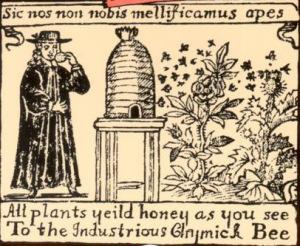 While not strictly considered a beer, mead does loosely fall into the same category. Whereas beer uses mainly malted grains for its fermentable sugars, mead uses primarily honey. Often meads are made with fruits, grains and even hops to impart unique aromas and flavors. It is often a potent drink with alcohol levels ranging from 8% ABV to over 20%.
While not strictly considered a beer, mead does loosely fall into the same category. Whereas beer uses mainly malted grains for its fermentable sugars, mead uses primarily honey. Often meads are made with fruits, grains and even hops to impart unique aromas and flavors. It is often a potent drink with alcohol levels ranging from 8% ABV to over 20%.
The exact origin of mead is lost to the veils of time, but many archeologists believe that, like the best discoveries, it was a sort of happy coincidence. Thousands of years ago, man lived a nomadic existence in Africa. He stayed in a particular place only as long as the food held out. As he wandered the plains of Africa, one nomad found himself in need of something to sate his thirst.
A common feature of the African plains is the baobab tree. These massive trees have trunks that are as big around as tanker trucks and its lower limbs were often used by elephants to scratch hard-to-reach itches on their backs. Occasionally, a limb would break off during these scratching sessions causing a hollow in the trunk of the tree.
During the dry seasons, the hollows in the tree trunks made an excellent location for bees to build their hives and make honey. But, during the wet seasons, those same hollows would fill with water swamping the hives and mixing the honey with water. Windborne yeast would infiltrate the honey-water mixture and fermentation would begin.
The nomads, knowing that the hollows in the baobabs often contained water, sought out the trees for the water contained in the hollows. One day one nomad came across a hollow that had held a bee hive and tasted the water collected inside. It was sweet, cool and delicious. After drinking his fill he began to feel a strange euphoria and attributed it to the syrupy liquid. He drank more and, finding himself unable to walk far, decided to lay down for a nap. Unbeknownst to him, he had just discovered one of the world’s first alcoholic drinks and was about to discover the bane of all drinkers, the hangover.
As history progressed, so did the making of mead. Archeologists have discovered evidence that the drink was produced by man as early as 2,000 years before the Christian era by the Chinese. But, they have also uncovered proof that Europeans fermented mead around the same time. Descriptions of mead can be found in the sacred books of Hinduism as well as the teachings of Aristotle. During the Golden Age of Ancient Greece, mead was said to be the drink of choice by both aristocracy and commoners alike.
Today mead is a much more sophisticated drink than it was in history and is brewed with as much care and craftsmanship as craft beers. It is produced in a meadery and, depending on the way it is made, can be classified one of several different ways. Like wine, mead can be dry, semi-sweet or sweet. Mead that is made with spices such as cloves, cinnamon or nutmeg or herbs such as meadowsweet, hops, or even lavender or chamomile, is called a metheglin. While mead that contains fruit such as raspberry, blackberry or strawberry is called a melomel. A mead that is fermented with grape juice is called a pyment. These are just a few of the many types of mead available that are brewed using a variety of methods and adjuncts.
On Friday, February 28, Dahlia’s Pour House in the King Street Beer District, is holding a mead tasting that will include eight meads to try as well as light snacks to enjoy them with. The meads that will be offered include:
Redstone Meadery’s Black Raspberry Nectar made with black raspberries, Sunshine Nectar with apricots and Nectar of the Hops an intriguing blend of hoppiness and honey.
B. Nektar Meadery’s Necromango made with mango juice, honey and black pepper, Black Fang sparkling session mead made with honey, blackberry, clove and orange zest and Zombie Killer an apple cider mead with Michigan honey and cherry juice.
Twisted Pine Brewery’s West Bound Braggot brewed with a light grain bill, orange blossom honey, pungent Citra hops, Tasmanian pepper berries, and Buddha’s Hand, a fragrant citrus fruit, and then fermented this unique ale with Belgian saison yeast.
Crafted Artisan Meadery’s Pollinator that is dry-hopped with Cascade hops and spiced with blackberry hydromel.
Tickets for the event are available at Dahlia’s Pour House and are $35 in advance of $40 at the door. If you are looking for a unique Valentine’s Day gift for your sweetheart, you can purchase a couples’ tickets before February 14th for $60. For more information contact Dahlia’s Pour House at 2695 Post St, Jacksonville, FL 32204.
